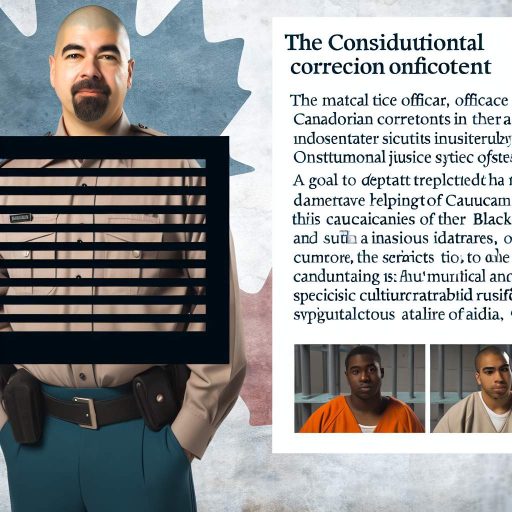Overview of the Correctional Officer Role in Canada
Correctional officers play a crucial role in Canada’s justice system.
They supervise individuals in correctional facilities, ensuring safety and security.
Officers also maintain order among inmates and enforce facility rules.
They interact with inmates daily, facilitating rehabilitation and support programs.
Moreover, they conduct searches and monitor inmate activities.
In addition to these duties, they document incidents and prepare reports.
Effective communication skills are vital for correctional officers.
This role requires collaboration with other staff members and agencies.
Additionally, officers must be prepared for emergencies and conflict situations.
They receive training on crisis intervention and de-escalation techniques.
Furthermore, correctional officers must uphold ethical standards and conduct.
The role demands resilience, empathy, and strong problem-solving skills.
Therefore, successful candidates often possess a unique blend of attributes.
In Canada, correctional officers work within federal and provincial systems.
Federal officers are employed by the Correctional Service of Canada.
Provincial officers typically work with regional government’s correctional services.
Career advancement opportunities exist for dedicated and skilled individuals.
With experience, officers can move into supervisory or specialized roles.
They may also pursue opportunities in administration or policy development.
Gaining additional qualifications enhances their prospects in the field.
Overall, correctional officers play a vital role in public safety in Canada.
Entry-Level Requirements and Skills Needed for Correctional Officers
Basic Requirements
To become a correctional officer in Canada, you must meet specific prerequisites.
A valid driver’s license is generally required.
You should have a high school diploma or equivalent certification.
Moreover, many institutions prefer candidates with post-secondary education.
Unlock Your Career Potential
Visualize a clear path to success with our tailored Career Consulting service. Personalized insights in just 1-3 days.
Get StartedBackground checks are standard to ensure candidate suitability.
Essential Skills
Correctional officers must possess strong communication skills.
Effective listening enhances interactions with inmates and staff.
Furthermore, problem-solving abilities are crucial in this role.
Officers often face unexpected situations that require quick thinking.
Physical Fitness
Maintaining physical fitness is vital for correctional officers.
They may need to intervene in confrontational situations.
Therefore, good strength and stamina are essential.
Interpersonal Skills
Interpersonal skills are foundational for building rapport with inmates.
Officers must handle conflicts calmly and professionally.
Additionally, empathy can aid in understanding inmate behavior.
Understanding of Legal Standards
A thorough understanding of the legal system is important.
Correctional officers must adhere to strict policies and regulations.
Keeping updated on laws helps in managing inmate rights and safety.
Potential Career Paths Within the Correctional System
Entry-Level Opportunities
New correctional officers begin their careers primarily as entry-level staff.
They undertake responsibilities such as managing inmate behavior and monitoring daily activities.
Additionally, they provide security and ensure the safety of all facility personnel.
Promotional Pathways
After gaining experience, many correctional officers seek promotional opportunities.
Advancement may lead to roles such as sergeant or lieutenant within the correctional facility.
These positions involve additional responsibilities, including staff supervision and training.
Specialized Roles
Correctional officers can also pursue specialized roles.
Roles such as crisis negotiator, probation officer, or behavioral analyst require further training.
These positions focus on rehabilitation efforts and crisis management.
Administrative Positions
With significant experience, correctional officers may qualify for administrative positions.
Positions such as facility manager or program coordinator become available to them.
These roles involve strategic planning and oversight of correctional programs.
Training and Development Opportunities
Many organizations offer training programs for correctional officers aspiring for advancement.
Courses in leadership, conflict resolution, and crisis intervention enhance their skills.
Furthermore, officers may participate in workshops to stay updated on best practices.
Educational Pathways
Pursuing higher education can greatly influence career advancement.
Degrees in criminal justice, sociology, or psychology are highly beneficial.
Many correctional agencies promote educational growth and support continued learning.
Uncover the Details: Skills Required to Succeed as an Ombudsman
The Importance of Experience and On-the-Job Training for Advancement
Value of Experience
Experience plays a crucial role in the advancement of correctional officers.
It fosters a deep understanding of daily operations within correctional facilities.
Moreover, seasoned officers can develop strong problem-solving skills over time.
They learn to navigate complex interpersonal dynamics with inmates and staff.
Additionally, hands-on experience builds confidence in managing crises effectively.
Benefits of On-the-Job Training
On-the-job training is essential for skill enhancement in this field.
It allows correctional officers to learn in real-time under guided supervision.
This training helps them adapt to various situations with greater ease.
Furthermore, it creates opportunities for mentorship from experienced colleagues.
Mentorship often accelerates personal and professional growth.
Pathways for Professional Development
Correctional institutions often offer formal training programs for staff.
These programs focus on areas such as crisis intervention and conflict resolution.
Officers are encouraged to participate in workshops and seminars.
Such opportunities enhance their qualifications for promotions.
Moreover, networking with professionals through advanced training can open doors.
Emphasizing Continuous Learning
Continuous learning is vital in the rapidly evolving field of corrections.
Technology and policies change, requiring officers to stay informed.
Regularly updating knowledge enhances career prospects significantly.
Officers who seek further education often position themselves for leadership roles.
Ultimately, a commitment to learning reflects dedication to the profession.
You Might Also Like: Key Characteristics of Successful Correctional Officers
Educational Opportunities and Certifications That Enhance Career Prospects
Importance of Education for Correctional Officers
Education plays a crucial role in career advancement for correctional officers.
It provides essential skills necessary for effective performance in the field.
Higher education often leads to better job opportunities and promotions.
Moreover, it can boost earning potential over time.
Basic Educational Requirements
Correctional officers typically need a high school diploma or equivalent.
Many employers favor candidates with post-secondary education in relevant fields.
Relevant fields include criminal justice, psychology, and sociology.
Additionally, community colleges offer specialized programs for aspiring officers.
Advanced Degrees and Their Benefits
Obtaining a bachelor’s degree can significantly enhance career prospects.
Many positions in management and specialized roles require advanced education.
Degrees in criminal justice or public administration are particularly beneficial.
Furthermore, advanced education can improve communication and leadership skills.
Certifications to Consider
Certifications provide valuable credentials that enhance employability.
Various organizations offer certifications designed for correctional professionals.
For example, the Correctional Peace Officer Program is popular across Canada.
Additionally, the Canadian Certified Correctional Services Professional certification is available.
Training Programs and Workshops
Ongoing training programs are essential for career advancement.
Workshops often focus on specific skills like crisis intervention and conflict resolution.
Organizations such as the Canadian Association of Chiefs of Police offer valuable training resources.
Moreover, these programs help officers stay updated on best practices and legislation.
Networking and Professional Associations
Joining professional associations can greatly benefit correctional officers.
These associations provide networking opportunities and access to mentorship.
They also offer resources for continuing education and professional development.
Examples of such associations include the Canadian Criminal Justice Association.
Online Courses and Distance Learning
Online education has become increasingly popular among correctional officers.
Distance learning allows flexibility and convenience for busy professionals.
Many prestigious universities offer online programs in criminal justice.
Furthermore, these courses cover a variety of topics relevant to the field.
Future Trends in Correctional Education
Education in the correctional field will continue to evolve over the years.
Future trends may include more technology integration in training programs.
Additionally, mental health and rehabilitation-focused programs will likely expand.
This evolution will enhance the overall effectiveness of correctional officers.
Uncover the Details: Day in the Life of a Canadian Border Services Officer

Role of Mentorship and Networking in Career Advancement
Importance of Mentorship
Mentorship plays a critical role in the career development of correctional officers.
A good mentor provides guidance and support tailored to individual needs.
Moreover, mentors share valuable insights from their own experiences.
This guidance helps mentees navigate career challenges effectively.
Mentorship can lead to greater job satisfaction and professional growth.
Building Professional Networks
Networking is essential for career advancement in corrections.
Connecting with professionals opens doors to new opportunities.
Creating relationships with colleagues fosters collaboration and support.
Additionally, attending industry events can expand one’s network significantly.
Online platforms, such as LinkedIn, facilitate networking beyond geographic boundaries.
Finding a Mentor
Identifying the right mentor is crucial for personal development.
Look for someone with experience in your desired area of advancement.
Approaching a mentor should be done respectfully and thoughtfully.
Consider the mentor’s availability and willingness to invest time.
A successful mentorship relationship is built on mutual respect and trust.
Participating in Mentoring Programs
Many organizations offer formal mentoring programs for correctional officers.
These programs can provide structured guidance and resources.
Engaging in such programs enhances learning and career prospects.
Participating in these initiatives demonstrates a commitment to professional growth.
Networking Strategies
Effective networking involves clear communication and active listening.
Join local chapters of professional organizations related to corrections.
Volunteering for committees can also enhance your visibility.
Always follow up with new contacts to nurture those relationships.
Share your own experiences and insights to build rapport.
See Related Content: How Ombudsmen Uphold Rights and Justice in Canada
Impact of Continued Professional Development on Wages and Promotions
Significance of Professional Development
Continued professional development is crucial for correctional officers in Canada.
This type of growth enhances skills and knowledge relevant to the job.
As a result, it often leads to increased confidence on the job.
Professionals who engage in training can better manage challenging situations.
Additionally, well-trained staff create a safer environment for everyone.
Effects on Wages
Engaging in professional development may significantly impact wages for correctional officers.
Candidates with advanced certifications often qualify for higher pay grades.
Research indicates that ongoing education can lead to a salary increase over time.
Moreover, employers recognize and reward employees who invest in their skills.
In essence, professional development becomes an investment in one’s financial future.
Impact on Promotions
Continued education also plays a vital role in the promotion process.
Officers who participate in training are more likely to be considered for leadership roles.
Proactive learning demonstrates a commitment to the field and the organization.
Many correctional facilities prioritize officers with advanced training for promotions.
As a result, those who develop professionally are better positioned for career advancement.
Examples of Professional Development Opportunities
Various avenues exist for correctional officers to pursue professional development.
These include workshops, seminars, and degree programs tailored to criminal justice.
Online courses offer flexibility for officers to learn at their own pace.
Certifications in areas such as conflict resolution or crisis management are also valuable.
Participating in mentorship programs can further enhance skills and career trajectories.
Future Trends in the Correctional System
Changing Role of Correctional Officers
Correctional officers will adapt to new roles in the justice system.
Consequently, these roles will shift toward rehabilitation efforts.
They will focus on managing inmate behavior positively.
Integration of Technology
Technology will play a vital role in future correctional facilities.
For instance, data analytics will enhance threat assessment.
Additionally, virtual reality could aid in training programs.
This technology will improve safety and operational efficiency.
Emphasis on Mental Health
Mental health support will become crucial in correctional settings.
As a result, officers will receive training to manage such issues.
This approach will foster a healthier environment for inmates.
Community Corrections Expansion
Community-based corrections will expand significantly.
This trend aims to reduce overcrowding in facilities.
Officers will interact more with community-based programs.
Such programs will allow for a more rehabilitative approach.
Opportunities for Growth
Promotional Pathways
Officers can advance through various promotional roles.
They may become sergeants or lieutenants based on performance.
Moreover, specialized training will provide more opportunities.
Additional Training and Education
Pursuing advanced education can enhance career prospects.
Officers may consider degrees in criminal justice or related fields.
Certifications in conflict resolution will also be beneficial.
Leadership Roles
Leadership opportunities will increase within the correctional system.
With experience, officers can lead teams and initiatives.
Additionally, they may participate in policy-making discussions.
This involvement can shape future correctional practices.
Networking and Professional Associations
Joining professional organizations will expand useful networks.
These associations offer resources for continuing education.
Members can attend workshops and conferences regularly.
Such engagement will keep officers updated on industry standards.
Additional Resources
Departments and agencies – Canada.ca
Innovation, Science and Economic Development Canada | Official site




